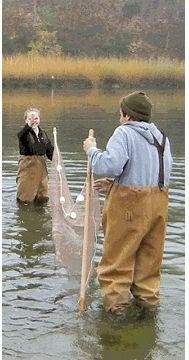 Over the past year, more than 20 school groups have participated in educational opportunities offered by the Marine Sciences Research Center’s (MSRC) coastal marine laboratory at Flax Pond. Marsh ecology tours, laboratory research highlights, and “touch tanks” with local marine life are included in these educational experiences. The Flax Pond Marine Laboratory is situated on a 0.6 km2; salt marsh on Long Island’s north shore about 5 miles from Stony Brook University. The lab is geared toward research, training and public education.
Over the past year, more than 20 school groups have participated in educational opportunities offered by the Marine Sciences Research Center’s (MSRC) coastal marine laboratory at Flax Pond. Marsh ecology tours, laboratory research highlights, and “touch tanks” with local marine life are included in these educational experiences. The Flax Pond Marine Laboratory is situated on a 0.6 km2; salt marsh on Long Island’s north shore about 5 miles from Stony Brook University. The lab is geared toward research, training and public education.
Steve Abrams manages the laboratory and organizes the educational programs offered at Flax Pond. With over 20 years of experience in environmental education, Abrams notes, “The only way to truly understand the natural world is through hand-on experiential education. “ His own experiences came from working in educational programs at Garview Point Museum and Sands Point Preserve – both pars of the Nassau County Museum System – as well as the Bronx Zoo and NY Aquarium.
Students have come from as far away as New York City to learn about salt marsh ecology at the Flax Pond Marine Laboratory. Chris Dumford, principal of York Preparatory School in Manhattan, brought his 12th grade marine biology class to explore the marsh and learn about on-going research at the lab. Dumford said, “The students loved using the seine nets and discovering the animals just below the water’s surface.”
Four classes from Suffolk County Community College also visited the marsh recently. Dr. Jean Anastasi, who did part of her Ph.D. research at the lab in the late 1990s, brought students from two oceanography classes. She was looking for a location that exposed here students to many aspects of the marine environment. “Flax Pond is an ideal site,” she explained, “because they can learn about the importance of wetlands, observe many species of invertebrates, fish, and marine birds, and view the dynamic beach environment, all in one place.”
Plans are being developed to expand educational and research opportunities at Flax Pond Marine Laboratory. MSRC’s Dean and Director David Conover noted that the goals of the renovation will include improvement of the seawater system and creation of a wet lab space dedicated to teaching, i.e., a ‘living marine classroom.’
For more information on the Flax Pond Marine Laboratory, contact Steve Abrams at 631-632-8709 or via e-mail at Stephen.Abrams@stonybrook.edu.




You must be logged in to post a comment.